Description of the course:
The course will be focused on the application of advanced kinetics techniques (stopped flow binding and folding experiments, FRET, T-Jump) to study protein structure and functions and to dissect several kinetics mechanisms.
Understanding the links between protein structure and function is a critical task of Molecular Biology. Such a goal has critical scientific implications, spanning from basic research to practical applications such as drug discovery and the development of new therapies. In this perspective, advanced kinetic approaches have emerged as powerful tools for unravelling these features: the ESC4 course “Advanced Kinetics Approaches to Unravel Protein Structure and Function” covers a range of kinetic and spectroscopic techniques that may help scientist to unveil the subtle links between protein structure and function. These techniques include stopped-flow, T-jump and Forster resonance energy transfer (FRET) experiments.
Read more about this MOSBRI course and apply to take part here.
